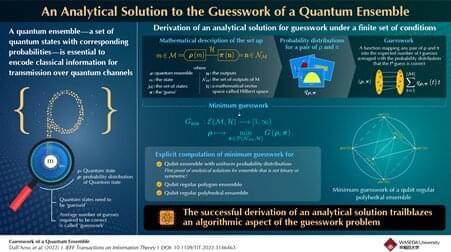Given the rapid pace at which technology is developing, it comes as no surprise that quantum technologies will become commonplace within decades. A big part of ushering in this new age of quantum computing requires a new understanding of both classical and quantum information and how the two can be related to each other.
Before one can send classical information across quantum channels, it needs to be encoded first. This encoding is done by means of quantum ensembles. A quantum ensemble refers to a set of quantum states, each with its own probability. To accurately receive the transmitted information, the receiver has to repeatedly ‘guess’ the state of the information being sent. This constitutes a cost function that is called ‘guesswork.’ Guesswork refers to the average number of guesses required to correctly guess the state.
The concept of guesswork has been studied at length in classical ensembles, but the subject is still new for quantum ensembles. Recently, a research team from Japan—consisting of Prof. Takeshi Koshiba of Waseda University, Michele Dall’Arno from Waseda University and Kyoto University, and Prof. Francesco Buscemi from Nagoya University—has derived analytical solutions to the guesswork problem subject to a finite set of conditions. “The guesswork problem is fundamental in many scientific areas in which machine learning techniques or artificial intelligence are used. Our results trailblaze an algorithmic aspect of the guesswork problem,” says Koshiba. Their findings are published in IEEE Transactions on Information Theory.
